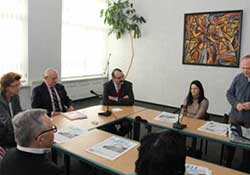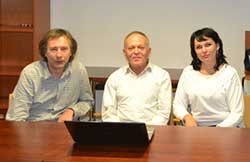Ukrainian Physical Society (UPS) Cooperation With the APS
Yaroslaw Bazaliy, Mykhaylo Belogolovskii and George Gamota

Meeting on October 12 to discuss joint programs between the UPS and APS. From right to left: Mykhaylo Belogolovskii, Olha Gornostaeva, Maksym Strikha, George Gamota, Natalia Artiukhovska, and Gennadiy Akimov

Organizers of the first joint webinar on November 12. From left to right: Yaroslaw Bazaliy, Mykhaylo Belogolovskii and Olena Zhitlukhina
The UPS and APS have a long record of working together since 1992 when a joint agreement on cooperation was signed by APS’s Judy Franz and UPS founding president Viktor Baryakhtar. Most recently, efforts have been initiated to help the displaced physicists and in general to help UPS members become more engaged with their Western colleagues. At the beginning of 2015 a group of Ukrainian and American physicists discussed ways of helping their colleagues from the Donetsk and Luhansk regions that were displaced due to the military conflict in the East of Ukraine. Concurrently, George Gamota brought the dire situation in Ukraine to the attention of APS International Affairs Director Amy Flatten, and a plan of action was agreed upon. This included aid to physicists in Ukraine, and enhancing fruitful collaboration between APS and UPS members. The goal was to team up with each other to jump-start projects that can later become ongoing and self-sufficient. We would like to report on some successes already achieved and outline a few additional efforts being undertaken. Two publications about the difficulties that physicists in Ukraine are currently facing appeared in the April 2015 issue of APS News and the August 2015 issue of Physics Today. To date, the APS has provided free membership to the Ukrainian physicists relocated from the East of Ukraine and initiated awareness of different services that are available from various APS activities. This is not only highly appreciated by many displaced physicists but also by the general UPS membership.
Additional support for the Ukrainian displaced scientists came from CRDF (Civilian Research and Development Foundation) Global, a US non-profit organization that promotes international scientific and technical collaboration through grants, technical resources and entrepreneurial training. In 2016, CRDF Global will carry out competitions under its ongoing program of support of Ukrainian and US scientists joint research projects and the S&T entrepreneurship program. CRDF Global will pay special attention to participation of displaced scientists in these programs. Recently, CRDF Global established an Emergency Fund for Ukrainian Scientists for accumulating charitable contributions and other resources with the goal to help scientists relocated from the East of Ukraine. CRDF Global anticipates that through this Fund, US scientists and laboratories will have a possibility to help their Ukrainian colleagues.
On October 12th, 2015 George Gamota met with UPS President Maksym Strikha who also is the current Deputy Minister of Education and Science, Natalia Artiukhovska, CRDF Global Representative in Ukraine as well as a group of displaced scientists to discuss the scope of cooperation. Strikha outlined the steps that the Ukrainian government has taken to help the 12,000 scientific workers from 26 universities and institutes temporarily evacuated from areas outside the control of the Ukrainian government. While the people were displaced and are safe, he emphasized that all laboratory equipment, libraries, and other assets in these institu-tions remained in the occupied cities and the Ministry is making great efforts to offset these losses. For example, the UPS with the assistance of the Italian Physical Society opened a new computer lab for the physical-technical faculty of the Donetsk National University, temporarily housed in Vinnytsia, a city in central Ukraine.
We cite two initiatives that are being developed and will be continuing as a result of the APS-UPS collaboration.
Technology Transfer and Entrepreneurship in Physics
The interest in physics as a career path is currently decreasing in Ukraine. One of the main questions which have become important for the physics community is what can be done to ensure physics education is useful for society. In the post-Soviet countries physics and mathematics graduates traditionally keep seeking purely academic basic research careers, while the world has rapidly changed and has moved towards commercial applications of physics in fields such as alternative energy sources, nano-technology, quantum information, biophysics and medical devices. The future of our discipline depends not only on providing a first-rate basic understanding of physical principles, but also training in what is increasingly the largest employment base for the physicists worldwide - the private sector, particularly high-tech start-ups. This means that physics-based entrepreneurship courses should find their way into university programs, and established scientists should be encouraged to turn towards the needs of industry. Entrepreneurial skills provide an alternate career choice for young physicists.
Through APS we have learned about the joint initiative of the APS, the Institute of Physics, and the Abdus Salam International Centre for Theoretical Physics in conducting such workshops on Entrepreneurship for Physicists and Engineers from Developing Countries. The workshop takes place at ICTP, Trieste every other year. The same team of experts has conducted similar regional workshops in about fifteen developing countries all over the world. The objectives of this one-week intensive meeting are to introduce to the scientists the key concepts of intellectual property, technology transfer and commercialization of inventions. Our plan is to initiate and conduct a similar workshop in Ukraine. At the moment, together with the organizers of the Trieste workshop we are looking for sponsors and are formulating its policy, program and aims. The long-range plan would be to extend this into a set of seminars and workshops for scientists working in academic institutions and universities in order to familiarize them with the tools necessary to take an idea from research to commercialization, the process of innovation, generation and protection of intellectual property, etc.
Internet-seminars (Webinars) for Physicists in Ukraine
Another important project that has been started is to promote integration of young Ukrainian researchers into the Western scientific community. Besides the obvious intellectual value, better integration has a clear potential for improving support prospects. In 2015 Ukraine became a full member of the European Commission grant program, Horizon 2020. While technically Ukrainian scientists, physicists in particular, can now utilize the same grant opportunities as any one of their European colleagues, in reality they are still hindered by many obstacles. A big one is the lack of experience and reputation within the European Commission grant system or, more broadly, lack of day-to-day collaborations with physicists from abroad. An average young researcher or graduate student in Ukraine can download and study any paper from the leading physics journals. However, the odds of him or her being present at a live talk given by a foreign physicist are slim. Visits and scientific exchanges occasionally happen, and some exceptional Ukrainian groups are well represented worldwide. But on average, scientific contacts have not reached a critical intensity. All this creates a very palpable cultural disconnect between Ukrainian scientists and the Western scientific community, a situation that should be changed as soon as possible.
Bridging this gap is a complex task to be approached in many ways. One of them is taken by a UPS pilot program offering internet-seminars with speakers from everywhere in the world presenting fresh results to Ukrainian audiences. Internet seminars (or webinars) are a natural inexpensive alternative to physical travel of the speaker. Of course, the question is how good such an alternative can be, and whether it can actually ensure enough scientific discussion and stimulate people-to-people interactions. On the technical side, APS generously offered its own webinar platform for the program. Working with Amy Flatten from the APS office on International Affairs and Sara Conners from the web management we were able to start using a very good webinar software suite right away. The UPS seminar coordinators could then concentrate on speaker invitations, advertising, and seminar organization. Notably, a very interesting aspect of a webinar is the way in which the attendees are encouraged to participate and devote their full attention to the talk. The first few seminars of the series have shown that some tricks employed by us seem to work and produce better interactivity. UPS now plans to continue the series to popularize it and increase participation. It seems that similar attempts are made throughout the world, by informal organizations, such as Latin American Webinars on Physics, and by established institutions, such as the Perimeter Institute.
Eventually the goal of the program is to trigger a proliferation of on-line seminars in Ukraine. With the technical details worked out during the pilot program, it will become easy to start a local seminar series and concentrate on inviting the best speakers in the world working in a given field. Such seminars will certainly make Ukrainian physicists one step closer to their western colleagues. How decisive will this step be? Quoting a wonderful theorist, M. I. Dyakonov, “the key aspect of the future is that it is unpredictable.” (http://arxiv.org/abs/cond-mat/0401369)
A description of the program can be found at http://boson.physics.sc.edu/~yar/UFT/
Perspectives
In our opinion, now it’s a time to forge and deepen relations between existing research groups of Ukrainian physicists and their foreign colleagues, including Ukrainian Diaspora. How to arrange the team-to-team cooperation is the problem the UPS is discussing now. We will highly appreciate new ideas and suggestions on that matter from the FIP members. For example, one can think about three-way international collaborations between physicists from the US, Ukraine, and developing countries in Asia or Africa. We believe that in the integrated global world Ukrainian physicists, despite their present plight, could act as effective and wanted partners for their colleagues abroad.
For further information please contact us.
Yaroslaw Bazaliy is an Associate Professor at the Department of Physics and Astronomy at the University of South Carolina. His research work is in the area of spintronics, and he actively explores new methods for remote collaboration and internet-based instruction. Yaroslaw received his Ph.D. degree from Stanford University. Email: yar@physics.sc.edu
Mykhaylo Belogolovskii is the head of the Joint Laboratory of Dynamics of Electronic Processes in Hybrid Structures established by the G. V. Kurdyumov Institute for Metal Physics, National Academy of Sciences of Ukraine in Kyiv and the Donetsk National University relocated to Viinnytsia due to the military conflict in eastern Ukraine. He is a coordinator of the Ukrainian-American working group on aid to physicists relocated from the Donetsk and Luhansk regions that was initiated by the UPS in 2015. Email: belogolovskii@ukr.net
George Gamota is a Senior Fellow of the APS and a Foreign Member of the Ukrainian Academy of Sciences. He was a former member of the Bell Labs technical staff, founding Director for Research at the Department of Defense and professor of physics at the University of Michigan. He specializes in benchmarking foreign S&T and entrepreneurship. He is the founder and current president of Science and Technology Management Associates, STMA LLC. Email: ggamota@STMA-LLC.com
